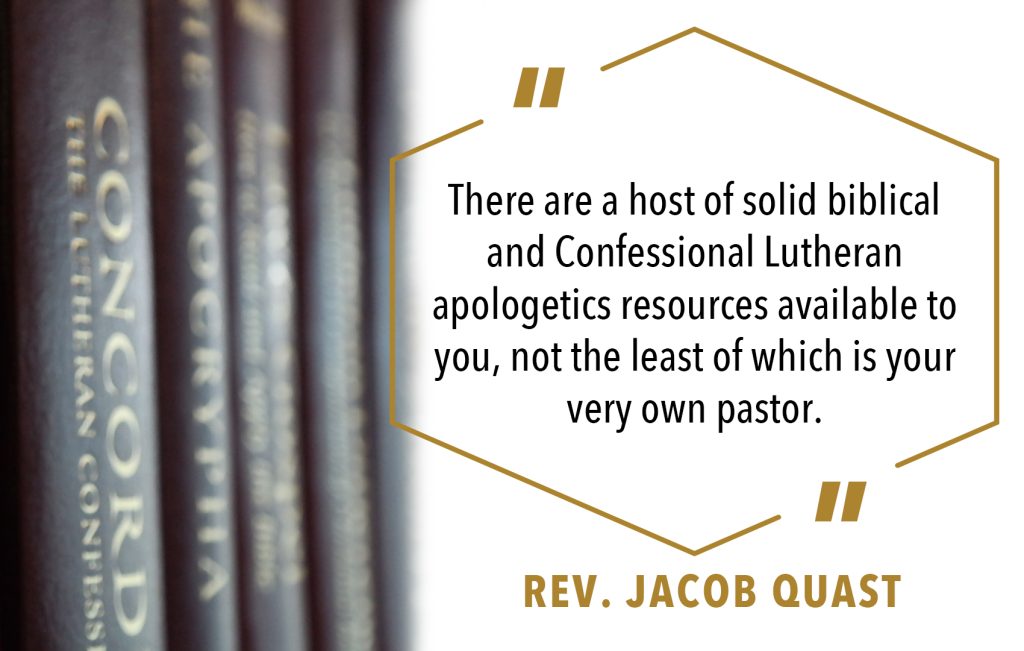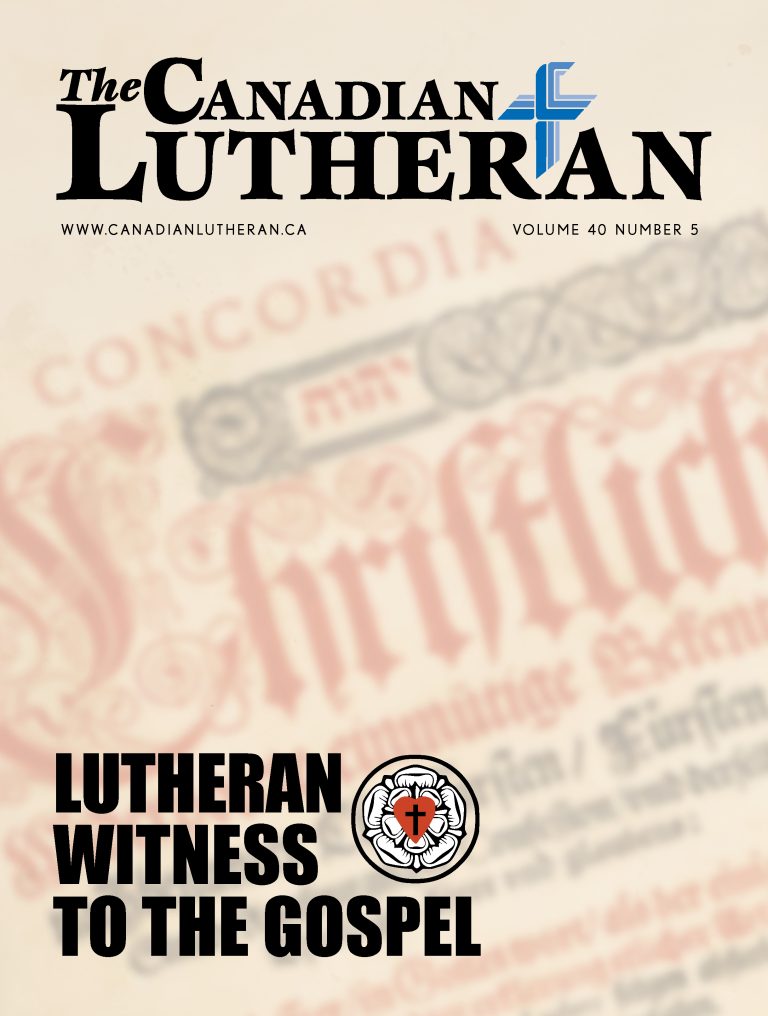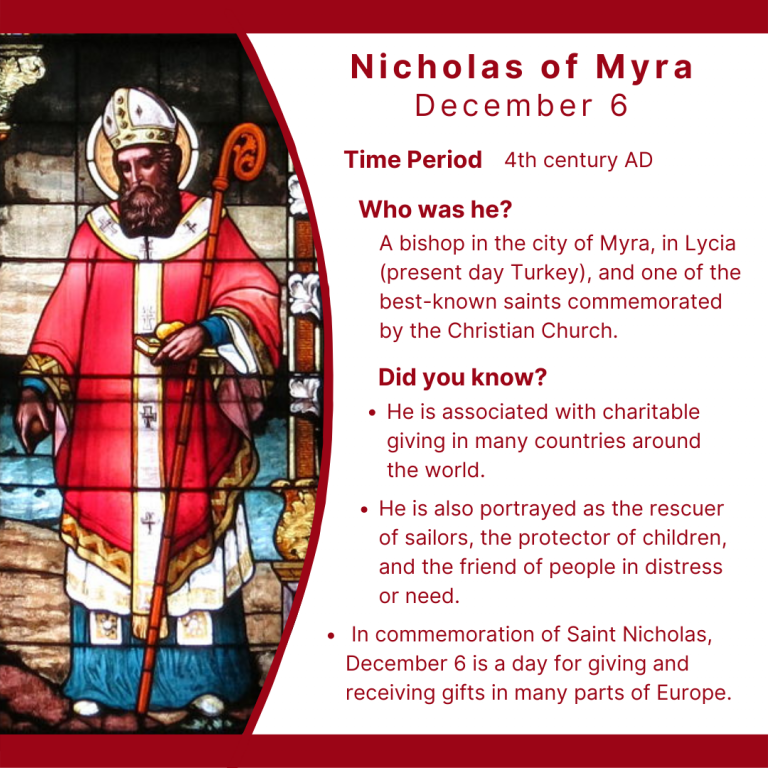Apologetics and Evangelism: Two Sides of the Same Coin

by Jacob Quast
In our previous two articles concerning missions, we have explored the foundation for the Mission of the Church: truth and love, recognizing that the Church in Mission reaches out with the truth of Jesus Christ and Him crucified, while also serving her neighbour in love. Furthermore, the Church is constantly in motion, being directed by the Holy Spirit to liberally scatter the life-giving Word of God to all people (Matthew 13:1-9, 18-23). But what is the Church to do when she encounters ideas that differ from her message of salvation through faith in Jesus Christ alone? How is she to respond when those whom she is trying to evangelize object to her message of truth—perhaps even deny the idea of truth itself? How ought she share the evangel—the Gospel—to those confused, or even hostile, to the singular message of salvation in Jesus?
Apologetics: Providing a Reason for the Hope that is Within Us
It may comfort you to know that this is nothing new in the life of the Church. Indeed, St. Peter writes in his first epistle that every Christian must always be “prepared to make a defense to anyone who asks you for a reason for the hope that is in you; yet do it with gentleness and respect” (1 Peter 3:15). The Greek word for “defense” is apologia, from which we get the word “apologetics.” This is not about “apologizing” or saying “I’m sorry,” but rather about providing a reasoned defense for the truth and the hope we have in Christ Jesus.
St. Paul engaged in apologetics while addressing the Athenians in Acts 17:22-34. This is nothing new in the life of the Church. While no one is ever “argued” into the Christian faith (for it is the Holy Spirit who works through the Word of the Gospel to create and sustain faith in peoples’ hearts), nonetheless it is helpful for each Christian desiring to evangelize to have a basic understanding of apologetics. One certainly does not need to be an apologetics expert, but it is beneficial to know that the Church has well-reasoned answers to the questions and objections that non-Christians may raise in the course of an evangelistic conversation.
Questions revolving around difficult topics—like the Problem of Evil (if God is all good, all loving, and all knowing, then why does evil exist?), the Existence of God, and even Creation—have been asked and answered by Christian theologians for centuries.
Questions revolving around difficult topics—like the Problem of Evil (if God is all good, all loving, and all knowing, then why does evil exist?), the Existence of God, and even Creation—have been asked and answered by Christian theologians for centuries. While the average Christian may not be able to recite the answers to these questions from memory, it is encouraging to know that the Church has good answers to these questions, and they may be shared in a later conversation. There are a host of solid biblical and Confessional Lutheran apologetics resources available to you, not the least of which is your very own pastor.
Breaking Barriers Down
Let it be clearly understood: one cannot be “argued” into the faith through clever apologetics arguments. For as St. Paul says in Romans 1:16-17, it is the Gospel alone which “is the power of God for salvation to everyone who believes, to the Jew first and also to the Greek. For in it the righteousness of God is revealed from faith for faith, as it is written, ‘The righteous shall live by faith.’” Only the Gospel message of Jesus Christ—epitomized in John 3:16—has the power to bring an unbeliever to faith by the working of the Holy Spirit.
But apologetics can help to break down barriers that unbelievers may have, which closes their ears to the word of truth. As such, it can be necessary in our evangelism proclamation to assist people in overcoming these objections through sound and reasonable arguments. The now sainted Rev. Dr. Rod Rosenbladt, one of America’s foremost theologians/apologists of the late 20th and early 21st centuries, often referred to the task of apologetics as a kind of “pre-evangelism.” That is, apologetics can help set the stage in a person’s heart to be more open to hearing the Gospel.
Conclusion
The Church’s great task and Mission, delegated to her by none other than her Lord Jesus, is to preach the Gospel—to evangelize—all nations. Sometimes this task requires us to be prepared to provide a reasoned defense to various objections. Christians must first listen carefully before attempting to dialogue. And Christians must always respond in love and charity, so that they may have the opportunity to proclaim the Gospel clearly. Indeed, the goal of apologetics is always to proclaim Jesus Christ and Him crucified. For it is only in hearing of Jesus that people are led to believe, and so be saved. For “faith comes from hearing, and hearing through the Word of Christ” (Romans 10:17).
—————
Rev. Jacob Quast is Director of Domestic Missions of Lutheran Church–Canada.



